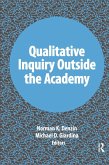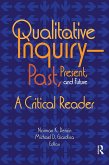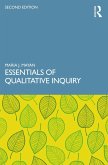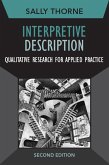Qualitative Inquiry in the Public Sphere (eBook, PDF)
Redaktion: Denzin, Norman K.; Giardina, Michael D.
48,95 €
48,95 €
inkl. MwSt.
Sofort per Download lieferbar

24 °P sammeln
48,95 €
Als Download kaufen

48,95 €
inkl. MwSt.
Sofort per Download lieferbar

24 °P sammeln
Jetzt verschenken
Alle Infos zum eBook verschenken
48,95 €
inkl. MwSt.
Sofort per Download lieferbar
Alle Infos zum eBook verschenken

24 °P sammeln
Qualitative Inquiry in the Public Sphere (eBook, PDF)
Redaktion: Denzin, Norman K.; Giardina, Michael D.
- Format: PDF
- Merkliste
- Auf die Merkliste
- Bewerten Bewerten
- Teilen
- Produkt teilen
- Produkterinnerung
- Produkterinnerung

Bitte loggen Sie sich zunächst in Ihr Kundenkonto ein oder registrieren Sie sich bei
bücher.de, um das eBook-Abo tolino select nutzen zu können.
Hier können Sie sich einloggen
Hier können Sie sich einloggen
Sie sind bereits eingeloggt. Klicken Sie auf 2. tolino select Abo, um fortzufahren.

Bitte loggen Sie sich zunächst in Ihr Kundenkonto ein oder registrieren Sie sich bei bücher.de, um das eBook-Abo tolino select nutzen zu können.
In the present political climate, qualitative researchers can bring rigorous research findings to public communities outside of the academy, directly affect public policies, social justice, education and diversity issues. The contributors of this book form a call to arms for the increasing relevance of qualitative research in the public sphere.
- Geräte: PC
- mit Kopierschutz
- eBook Hilfe
- Größe: 2.2MB
Andere Kunden interessierten sich auch für
![Qualitative Inquiry Outside the Academy (eBook, PDF) Qualitative Inquiry Outside the Academy (eBook, PDF)]() Qualitative Inquiry Outside the Academy (eBook, PDF)40,95 €
Qualitative Inquiry Outside the Academy (eBook, PDF)40,95 €![Qualitative Inquiry and the Politics of Research (eBook, PDF) Qualitative Inquiry and the Politics of Research (eBook, PDF)]() Qualitative Inquiry and the Politics of Research (eBook, PDF)39,95 €
Qualitative Inquiry and the Politics of Research (eBook, PDF)39,95 €![Qualitative Inquiry and the Politics of Evidence (eBook, PDF) Qualitative Inquiry and the Politics of Evidence (eBook, PDF)]() Qualitative Inquiry and the Politics of Evidence (eBook, PDF)40,95 €
Qualitative Inquiry and the Politics of Evidence (eBook, PDF)40,95 €![Qualitative Inquiry and Social Justice (eBook, PDF) Qualitative Inquiry and Social Justice (eBook, PDF)]() Qualitative Inquiry and Social Justice (eBook, PDF)40,95 €
Qualitative Inquiry and Social Justice (eBook, PDF)40,95 €![Qualitative Inquiry-Past, Present, and Future (eBook, PDF) Qualitative Inquiry-Past, Present, and Future (eBook, PDF)]() Qualitative Inquiry-Past, Present, and Future (eBook, PDF)40,95 €
Qualitative Inquiry-Past, Present, and Future (eBook, PDF)40,95 €![Essentials of Qualitative Inquiry (eBook, PDF) Essentials of Qualitative Inquiry (eBook, PDF)]() Maria J. MayanEssentials of Qualitative Inquiry (eBook, PDF)31,95 €
Maria J. MayanEssentials of Qualitative Inquiry (eBook, PDF)31,95 €![Interpretive Description (eBook, PDF) Interpretive Description (eBook, PDF)]() Sally ThorneInterpretive Description (eBook, PDF)45,95 €
Sally ThorneInterpretive Description (eBook, PDF)45,95 €-
-
-
In the present political climate, qualitative researchers can bring rigorous research findings to public communities outside of the academy, directly affect public policies, social justice, education and diversity issues. The contributors of this book form a call to arms for the increasing relevance of qualitative research in the public sphere.
Dieser Download kann aus rechtlichen Gründen nur mit Rechnungsadresse in A, B, BG, CY, CZ, D, DK, EW, E, FIN, F, GR, HR, H, IRL, I, LT, L, LR, M, NL, PL, P, R, S, SLO, SK ausgeliefert werden.
Produktdetails
- Produktdetails
- Verlag: Taylor & Francis eBooks
- Seitenzahl: 230
- Erscheinungstermin: 19. April 2018
- Englisch
- ISBN-13: 9781351388849
- Artikelnr.: 53377138
- Verlag: Taylor & Francis eBooks
- Seitenzahl: 230
- Erscheinungstermin: 19. April 2018
- Englisch
- ISBN-13: 9781351388849
- Artikelnr.: 53377138
- Herstellerkennzeichnung Die Herstellerinformationen sind derzeit nicht verfügbar.
Norman K. Denzin is Distinguished Emeritus Professor of Communications, College of Communications Scholar, and Research Professor of Communications, Sociology, and Humanities at the University of Illinois at Urbana-Champaign, USA. Michael D. Giardina is Professor of Media, Politics, and Physical Culture in the Department of Sport Management at Florida State University, USA.
Introduction Norman K. Denzin and Michael D. Giardina
Section I: Private Lives, Public Matters
Chapter 1. Fracking the faculty: The privatization of public knowledge, the
erosion of faculty worklife quality, the diminution of the liberal arts
Yvonna S. Lincoln
Chapter 2. Academic de-institutionalization and radical imagination vs.
audit culture Marc Spooner
Chapter 3. Into the woods: Scholarly publishing for a post-tenure world
Mitch Allen
Chapter 4. The BMJ debate and what it tells us about who says what, when
and where, about our qualitative inquiry Julianne Cheek
Chapter 5. Indigenous qualitative research in the neoliberal public sphere
Patrick Lewis
Chapter 6. Cultivating critical reflexivity in the public sphere Ping-Chun
Hsiung
Chapter 7. Individual needs, cultural barriers, public discourses: Taking
qualitative inquiry into the public sphere Silke Migala and Uwe Flick
Interlude
Chapter 8. On Being Awake after the 2016 U.S. Presidential election Ronald
J. Pelias
Section II: The Critical Imagination and Pedagogies of Change
Chapter 9. Research for revolutionaries by #JimScheurich James Joseph
Scheurich
Chapter 10. Method ol o gie s ...that encounter (slowness and) irregular
rhythm Mirka Koro-Ljungberg and Timothy Wells
Chapter 11. Collaborative autoethnography: An ethical approach to inquiry
that makes a difference Judith C. Lapadat
Chapter 12. Writing to it: Creating engagement with writing practice in and
with the not yet known in today's academy Jonathan Wyatt and Ken Gale
Chapter 13. The future of critical arts-based research: Creating political
spaces for resistance politics Susan Finley
Chapter 14. Musical chairs: Method, style, tradition James Salvo
Coda Pedagogy, civil rights, and the project of insurrectional democracy
Henry Giroux
Section I: Private Lives, Public Matters
Chapter 1. Fracking the faculty: The privatization of public knowledge, the
erosion of faculty worklife quality, the diminution of the liberal arts
Yvonna S. Lincoln
Chapter 2. Academic de-institutionalization and radical imagination vs.
audit culture Marc Spooner
Chapter 3. Into the woods: Scholarly publishing for a post-tenure world
Mitch Allen
Chapter 4. The BMJ debate and what it tells us about who says what, when
and where, about our qualitative inquiry Julianne Cheek
Chapter 5. Indigenous qualitative research in the neoliberal public sphere
Patrick Lewis
Chapter 6. Cultivating critical reflexivity in the public sphere Ping-Chun
Hsiung
Chapter 7. Individual needs, cultural barriers, public discourses: Taking
qualitative inquiry into the public sphere Silke Migala and Uwe Flick
Interlude
Chapter 8. On Being Awake after the 2016 U.S. Presidential election Ronald
J. Pelias
Section II: The Critical Imagination and Pedagogies of Change
Chapter 9. Research for revolutionaries by #JimScheurich James Joseph
Scheurich
Chapter 10. Method ol o gie s ...that encounter (slowness and) irregular
rhythm Mirka Koro-Ljungberg and Timothy Wells
Chapter 11. Collaborative autoethnography: An ethical approach to inquiry
that makes a difference Judith C. Lapadat
Chapter 12. Writing to it: Creating engagement with writing practice in and
with the not yet known in today's academy Jonathan Wyatt and Ken Gale
Chapter 13. The future of critical arts-based research: Creating political
spaces for resistance politics Susan Finley
Chapter 14. Musical chairs: Method, style, tradition James Salvo
Coda Pedagogy, civil rights, and the project of insurrectional democracy
Henry Giroux
Introduction Norman K. Denzin and Michael D. Giardina
Section I: Private Lives, Public Matters
Chapter 1. Fracking the faculty: The privatization of public knowledge, the
erosion of faculty worklife quality, the diminution of the liberal arts
Yvonna S. Lincoln
Chapter 2. Academic de-institutionalization and radical imagination vs.
audit culture Marc Spooner
Chapter 3. Into the woods: Scholarly publishing for a post-tenure world
Mitch Allen
Chapter 4. The BMJ debate and what it tells us about who says what, when
and where, about our qualitative inquiry Julianne Cheek
Chapter 5. Indigenous qualitative research in the neoliberal public sphere
Patrick Lewis
Chapter 6. Cultivating critical reflexivity in the public sphere Ping-Chun
Hsiung
Chapter 7. Individual needs, cultural barriers, public discourses: Taking
qualitative inquiry into the public sphere Silke Migala and Uwe Flick
Interlude
Chapter 8. On Being Awake after the 2016 U.S. Presidential election Ronald
J. Pelias
Section II: The Critical Imagination and Pedagogies of Change
Chapter 9. Research for revolutionaries by #JimScheurich James Joseph
Scheurich
Chapter 10. Method ol o gie s ...that encounter (slowness and) irregular
rhythm Mirka Koro-Ljungberg and Timothy Wells
Chapter 11. Collaborative autoethnography: An ethical approach to inquiry
that makes a difference Judith C. Lapadat
Chapter 12. Writing to it: Creating engagement with writing practice in and
with the not yet known in today's academy Jonathan Wyatt and Ken Gale
Chapter 13. The future of critical arts-based research: Creating political
spaces for resistance politics Susan Finley
Chapter 14. Musical chairs: Method, style, tradition James Salvo
Coda Pedagogy, civil rights, and the project of insurrectional democracy
Henry Giroux
Section I: Private Lives, Public Matters
Chapter 1. Fracking the faculty: The privatization of public knowledge, the
erosion of faculty worklife quality, the diminution of the liberal arts
Yvonna S. Lincoln
Chapter 2. Academic de-institutionalization and radical imagination vs.
audit culture Marc Spooner
Chapter 3. Into the woods: Scholarly publishing for a post-tenure world
Mitch Allen
Chapter 4. The BMJ debate and what it tells us about who says what, when
and where, about our qualitative inquiry Julianne Cheek
Chapter 5. Indigenous qualitative research in the neoliberal public sphere
Patrick Lewis
Chapter 6. Cultivating critical reflexivity in the public sphere Ping-Chun
Hsiung
Chapter 7. Individual needs, cultural barriers, public discourses: Taking
qualitative inquiry into the public sphere Silke Migala and Uwe Flick
Interlude
Chapter 8. On Being Awake after the 2016 U.S. Presidential election Ronald
J. Pelias
Section II: The Critical Imagination and Pedagogies of Change
Chapter 9. Research for revolutionaries by #JimScheurich James Joseph
Scheurich
Chapter 10. Method ol o gie s ...that encounter (slowness and) irregular
rhythm Mirka Koro-Ljungberg and Timothy Wells
Chapter 11. Collaborative autoethnography: An ethical approach to inquiry
that makes a difference Judith C. Lapadat
Chapter 12. Writing to it: Creating engagement with writing practice in and
with the not yet known in today's academy Jonathan Wyatt and Ken Gale
Chapter 13. The future of critical arts-based research: Creating political
spaces for resistance politics Susan Finley
Chapter 14. Musical chairs: Method, style, tradition James Salvo
Coda Pedagogy, civil rights, and the project of insurrectional democracy
Henry Giroux







